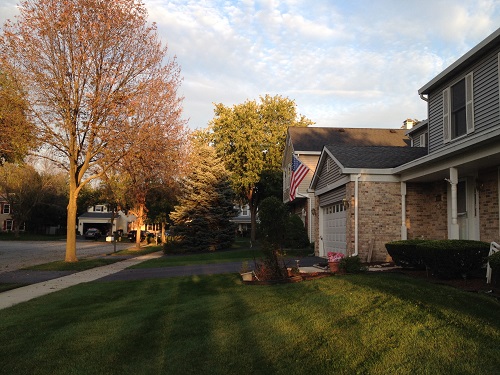Spring in the Midwest often doesn’t arrive until summer, when rain and gloom abruptly change to searing heat. School lets out and the Devil acquires an abundance of idle hands to tempt. Fuses get shorter as the mercury rises, making some people downright mean, doing and saying things they would normally consider inexcusable. Even the sun is belligerent, a festering, crimson boil when setting behind air so saturated it suffocates rather than nurtures.
September is a seasonal sigh of relief; the interlude between the contentious summer and the brutal winter. The Canadian highs that we’ll be cursing in January sweep out the humidity, bringing sharp blue skies and a nocturnal nip to the evening air we call “good sleeping weather.” The rising and setting sun is once again warm and welcoming instead of withering.
The kids go back to school, having traded T-shirts and shorts for T-shirts and jeans. It’s not like the old days when we dressed in new school clothes of fall colors—red, yellow, brown and orange. The Devil heads to the other hemisphere and waits for their idle hands to reappear. Summer gear goes back into the garage. The anal among us start thinking about Christmas shopping.
Autumn implies decay and decline for many but paradoxically, for me at least, it is a time of realignment and renewal. It is, after all, the season during which we celebrate the uniquely American ritual of Homecoming and the conflicting emotions it brings. We live vicariously through our offspring while reflecting upon own lives: the victories and defeats; opportunities taken or lost.
But that Home is often mythical, having eluded some of us during our early years. Decades later, Aaron Copland’s Two Pieces for String Orchestra granted me safe passage to a place in which I never lived but have known forever:
It’s late in the afternoon, just before dinnertime. Evening comes sooner these days but the sun is still a comforting disc in the sky, bathing the green leaves with a golden tint, a preview of the more spectacular and permanent change to come. Sometimes the setting sun highlights the dark grey clouds of a past storm on the east horizon. What’s done is done.
Windows and front doors are open and anyone on the sidewalk can hear the muffled voices coming from the black and white TVs in the living rooms: Moms are in kitchens, frying chicken, whipping potatoes or baking biscuits, wrapped in a floral apron nothing like Mrs. Cleaver’s cocktail dress and pearls. Dads are sitting in living rooms, smoking Luckies, listening to Chet and David or Walter, their somber voices relating the news; warning us rather than entertaining us. You won’t know about the Cuban Missile Crisis for another year or two, and the war in Southeast Asia that will take some of your friends is another five in the future.
This is a good time, when you found comfort nestling in Mother’s bosom.
In the coming weeks darkness will arrive earlier and earlier. The furnace will kick on for the first time, filling the house with that familiar, slightly musty scent, resurrecting memories of time long past. It will be a time to be alone with your thoughts and your soul; a time to be grateful for what you have and not mourn what you’ve lost. There is peace in autumn, the calm before the storms, before the bleak midwinter.
More songs of home by Aaron Copland:


